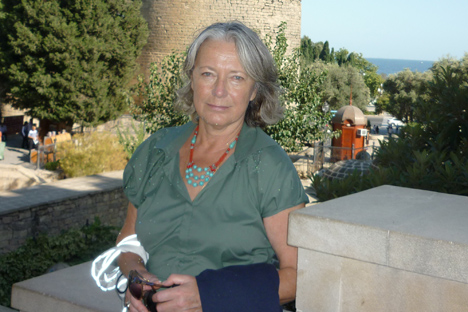
Anna Worontzoff-Weliaminoff, linguist and great granddaughter of Pushkin: ‘To understand Pushkin today, we need a new breed of poetic translators’ . Source: personal archive
How difficult is it to carry on the cultural legacy of an ancestor as important as Alexander Pushkin? RBTH talked to well-known linguist and the great-granddaughter of Pushkin, Anna Worontzoff-Weliaminoff, on the 214th anniversary of the poet’s birth.
RBTH: What does it mean to be a descendant of such a great Russian literary genius as Alexander Pushkin? Is it difficult to carry on his legacy?
Anna Worontzoff-Weliaminoff: It is very difficult, and something that has always surprised me is how the descendants of Dante and Leopardi in Italy and Shakespeare in England are not as well known as we are here.
It’s amazing how the love that Russians have for Pushkin also extends to his descendants and his entire family. I find this affection they have for Pushkin very beautiful and moving – it is he, after all, that best portrays Russian culture and spirit.
RBTH: Which country, besides Russia, loves and is most familiar with Pushkin?
A.W.W: Pushkin is pretty well known in Italy, as well as in France and in the Anglo-Saxon countries. Of course, Pushkin suffers from the fact that his poetry loses a lot in translation.
So, to understand and really love Pushkin, you need to know Russian and so this limits the dissemination of his works. However, I believe that Pushkin is increasing in popularity, even among those who do not have direct knowledge of the language.
RBTH: Are there any secrets or unpublished stories about Pushkin kept by his family?
A.W.W:There is nothing new or unknown about Pushkin. There are dozens of Pushkin scholars who have studied everything there is to study and have ransacked all the files and archives, so there is no longer anything new.
RBTH: Does Pushkin’s family conserve any artifacts that belonged to him?
A.W.W: No, Pushkin’s descendants have already donated everything to museums, especially to the Institute of Russian Literature (Pushkin House) in St Petersburg.
My father owned the seal of Pushkin’s wife, Natalya Goncharova, but then gave it to the Pushkin House Museum, which is located at number 12 Moika Ulitsa in St Petersburg – the last apartment where Pushkin lived.
RBTH: Have you visited the places connected with Pushkin?
A.W.W: Of course. I’ve visited several museums dedicated to him, and there are many in Russia.
Tsarskoye Selo, the high school where he studied and where he spent his youth.
And most importantly, I had the pleasure and the privilege of visiting Mikhailovskoye, the property where he spent years in exile and where he began to write some of his most famous works.
RBTH: What would you recommend to keep Pushkin's name and works alive around the world?
A.W.W: We need to find brilliant translators, maybe even poets who are capable of undertaking new translations of Pushkin’s works to make the most of his poetry.
RBTH: On the occasion of Pushkin's birthday, what message would you like to send to our readers?
A.W.W: Read Pushkin’s works. Read Russian literature and, if possible, learn our beautiful language.
All rights reserved by Rossiyskaya Gazeta.
Subscribe
to our newsletter!
Get the week's best stories straight to your inbox